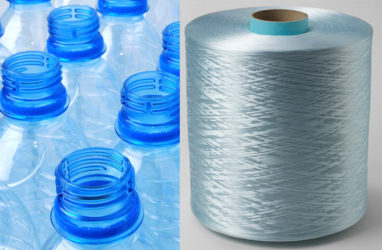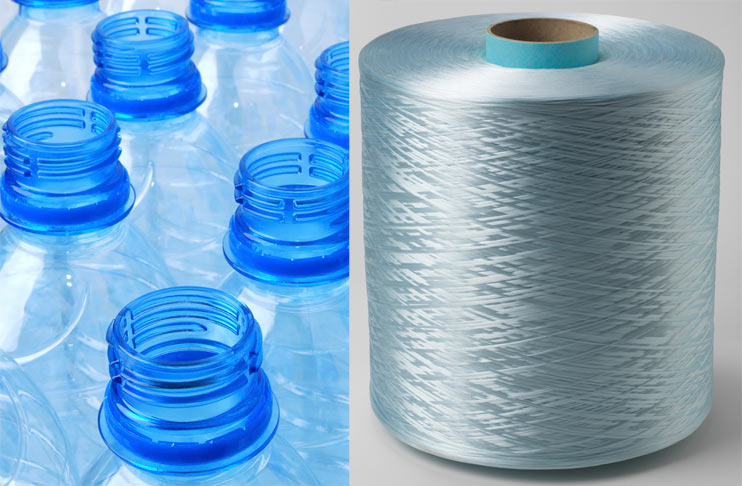
A new technology from Trützschler Switzerland AG and EREMA for production of BCF yarn from recycled PET (R-PET)
by Dr. Lassad Nasri / Senior Manager Technology and Product Management / Trützschler Switzerland AG
All of us use plastic bottles almost every day. Especially life without bottled water is not conceivable in developing and developed countries. Whereas glass was the main material for bottles in the last century, producers and consumers more and more favoured PET – polyethylenterephthalate – since the late 1980s. These “polyester” bottles come with the distinctive advantages of being light weight and almost unbreakable.
However, the success generates the new challenge of coping with billions of discarded bottles each year. When the bottle is empty we often throw it away, even though some of us would keep it for a second life. In many regions of the world recycling is an option. In Asia, for example, the probability that an empty bottle will be recycled is more than 75%. However, unfortunately there are also regions with recycling rates not exceeding 15%.
Recycling in Asia is widespread because especially entrepreneurs in China early recognized PET bottles as a valuable raw material. Using recycled polyester flakes offers numerous advantages: the economical aspect (flakes are cheaper than virgin chips) and the sustainability/good image aspect (green label) are to be mentioned among them.
Recycling PET bottles
A long and complex process chain is needed to turn a used bottle into usable raw material. It all starts with the collection of the bottles and pressing them into bales. Afterwards, the bales are opened, sorted out and grinded. The flakes obtained are washed (cold and hot) and separated from the polyolefin, which comes from caps and gaskets. After drying and metal separation, the flakes are practically ready to be filled into silos or big bags. A new cycle begins.
One of the main processes for recycled polyester is spinning staple fibers, which can be used for spun yarns, textile fillings or nonwoven materials for instance. These applications are well established with fleece shirts and throws being prominent examples.
Besides, due to many factors, the collection and recycling rate of plastic bottles is growing worldwide. Therefore it is time to explore new end uses of the recycled PET like carpet application for example.
Spinning BCF yarn from PET and R-PET
PET fibers offers numerous advantages in carpet applications. Especially the high stain resistance should be mentioned, which is even higher than that of chemically treated PA BCF. Moreover, PET can be spun in undyed form, which is not the case for PP. Undyed yarns can be twisted, heat set, dyed and tufted or the finished carpet can be printed.
Compared to staple fiber production, using R-PET for manufacturing continuous filaments is much more challenging. In filament spinning the quality of the yarn is determined by the homogeneity of the raw material. Recycled flakes are an instability factor, small deviations in quality can lead to an increased number of filament breaks or broken filaments. Further, the variance in the flakes quality could affect the yarn’s colour pick-up so the finished carpet shows streaks.
The EREMA – Trützschler system
This challenge is the reason that Trützschler and EREMA started to collaborate. EREMA Engineering Recycling Maschinen und Anlagen Ges.m.b.H. is a leading solution supplier in the area of plastic recycling systems and technologies. Both companies joined their efforts to develop a one-step system for pre-processing and spinning polyester flakes into Bulk Continuous Filament (BCF) for carpet applications.
The new system directly links EREMA’s VACUREMA® technology with Trützschler Switzerland’s symTTex BCF machinery. The EREMA part consists of a vacuum reactor, a directly linked single-screw extruder and a high-performance filter. Washed R-PET flakes are dried and decontaminated in the reactor, melted in the extruder and then forced through a large area filter of variable fineness. After that the high-quality melt is transferred to the Trützschler spinning system. The well-known and established high quality spin packs, dual shell draw rolls, the HPc texturizing system and fully driven winders form the filaments and wind them onto bobbins. An industrial line is already successfully running in Poland.
A one-step process for high-quality yarns
EREMA’s patented system enables the feeding of clean flakes directly into the reactor without using neither crystalliser nor dryer. A major advantage is the energy savings because energy-intensive drying and crystallizing steps are omitted.
When measuring the yarn’s viscosity we see that its IV value virtually reaches the IV value of the flakes. This proves that the drying process is extremely efficient – the vacuum before the extrusion process removes moisture and volatile material very effectively.
The combination of EREMA’s and Trützschler’s systems allows for producing distinct BCF yarns with high efficiency, excellent process stability and low transformation costs (table 1). Market requirements and expectations when using 100% R-PET flakes or mixtures of flakes with virgin material are fulfilled.
The cooperation of Trützschler with EREMA for recycled polyester constitutes a major pillar in Trützschler’s product portfolio of solutions. It perfectly adds to the already established systems for the production of PA6, PA6-6, virgin PET and PP BCF yarns. It is a step ahead toward market demand for more sustainable end products.


